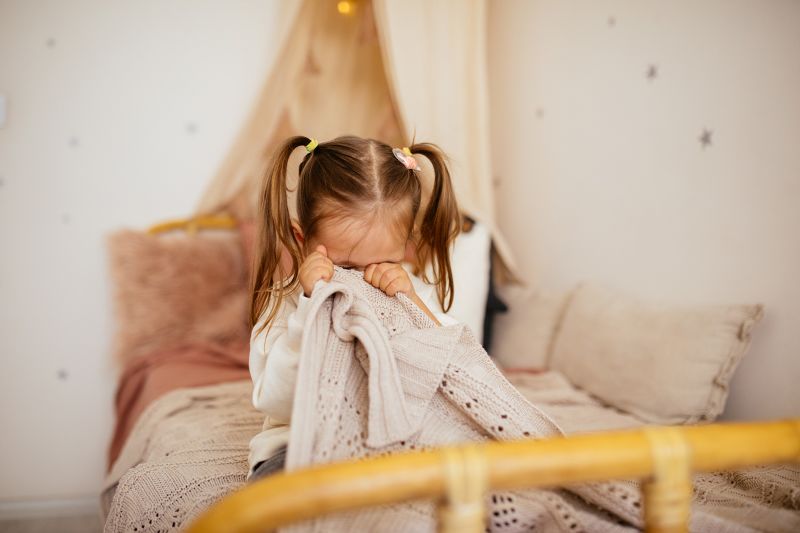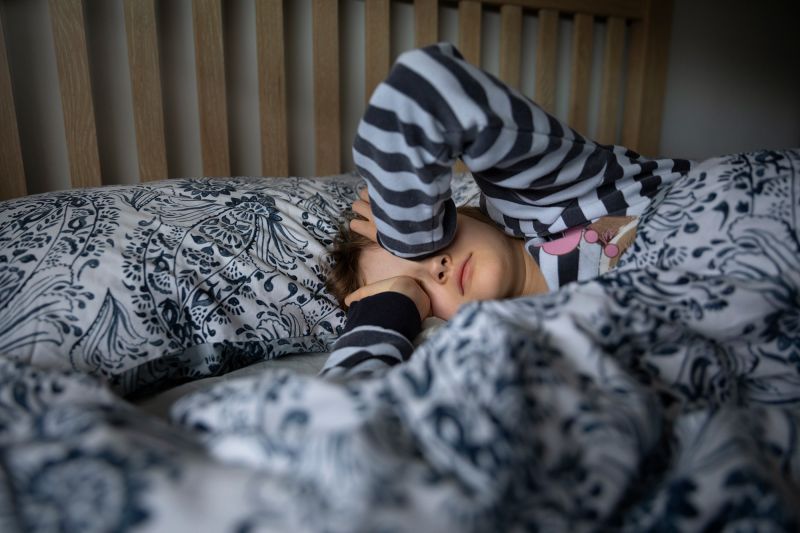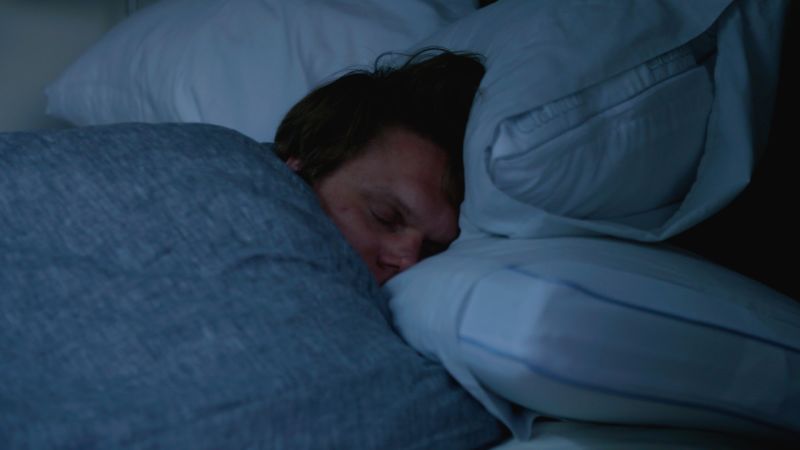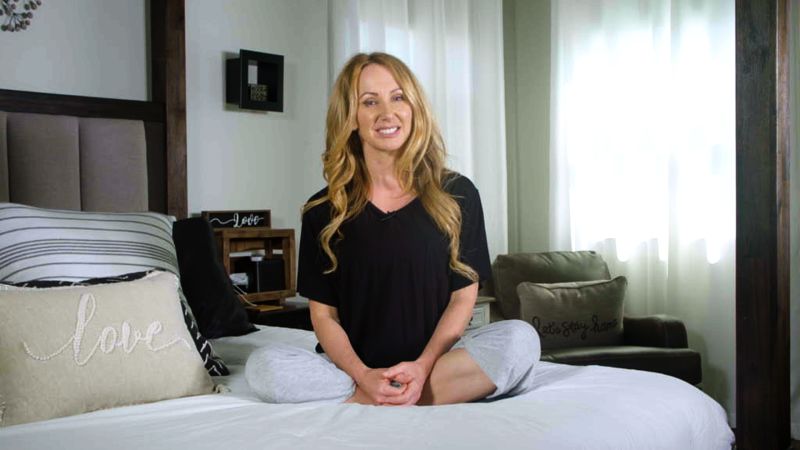1 in 4 parents say their young child has bedtime anxiety, new poll finds

When her daughter was 6 years old, Kelceymarie Warner began to notice her child’s hesitation before bedtime. “Her body would be a little more tense, and she would hyperventilate if you pushed the subject too soon, she really needed to be slowly moved into the cycle.”
Warner, who is a parent to four young daughters, believes that sticking to a nightly routine is the best way for her kids to have an easy transition to bedtime. But when her 6-year-old was experiencing bedtime anxiety, Warner had to make some additions to her routine.
Warner is not the only one — many parents know all too well what can be a nightly struggle to get their young children to bed.
A new C.S. Mott Children’s Hospital National Poll on Children’s Health reinforces this common difficulty, revealing that 1 in 4 parents said their child has trouble getting to sleep because they are anxious or worried. Over one-third of parents reported that their child doesn’t stay asleep throughout the night and often or occasionally wakes up upset or crying.
“From 1 year of age to 6 years of age, kids change a lot. The different phases that they go to are often pretty predictable: They’re scared of the dark, or as kids develop and their imagination develops … now they’re scared of monsters,” said Sarah Clark, Mott poll co-director and a research scientist in pediatrics at the University of Michigan in Ann Arbor. “It can be all sorts of things, and so often with kids, and I would argue adults too, some of those anxieties seem to come out at night.”
The Mott Poll was conducted in February with 781 parents who have at least one child age 1 to 6 years old.
Almost half reported their child leaving their bed and moving to the parent’s bed some or most nights, while 1 in 3 parents said their child often or occasionally insists that they stay in the room until the child falls asleep.
But some of these habits may be causing more trouble than the temporary relief they provide, Clark said. While a child may feel safe knowing the parent is in the room, they could later wake up and not be able to go back to sleep on their own, she added.
How to help an anxious child with bedtime
Warner said her child’s bedtime anxiety may have been caused by the major changes that happened when her youngest daughter was in the neonatal intensive care unit for three months.
“My husband and I were gone for extended periods during the day and even during the night because we wanted to be with a new baby who was born three months early — but we also needed to be there with our other children. I think she really struggled with a major change in her routine, and it just kind of triggered this very difficult time for her especially.”
Warner began incorporating activities into her daughter’s bedtime routine that would promote relaxation and reassurance, such as drinking herbal tea after bathtime, reading a story together and saying nightly affirmations like “I am loved” and “I am important.”
The new routine took longer than usual, sometimes up to an hour, but now, a little over a year later, her daughter is able to go through some parts of the routine on her own, and is able to better self-soothe, Warner said. She had posted her advice for other parents that may be facing a similar scenario on her TikTok account in 2023.
The most important factor in getting kids to bed is consistency and sticking with a bedtime routine, Mott Poll co-director Clark said. Ninety percent of polled parents reported having an established and consistent bedtime routine.
But some 27% described getting their child to bed was difficult, and those parents were more likely to not have a bedtime routine, stay in the room until the child fell asleep and keep the television or a video on.
“We know that young children really resonate with consistency and routine, and getting ready for bed helps their body and their brain know that this is the time to start winding down,” said Dr. Lauren Hartstein, an assistant professor in the department of psychiatry at the University of Arizona. She studies sleep and circadian health in early childhood and was not involved in the Mott poll.
Hartstein recommends limiting media use at night, especially avoiding exciting content that could stimulate the child’s brain and make it harder to wind down.
A January 2022 study that Hartstein led found that children around this age group were more sensitive to light at night than adults are, and it could interfere with a child’s production of natural melatonin, a hormone that regulates the sleep-wake cycle. Parents could find it beneficial to dim the lights an hour before bed, which would trigger a mental cue that it’s time to get ready to sleep soon, she added.
As for staying in the child’s bedroom until they fall asleep, Clark recommends leaving the room and returning to check in every few minutes, which lets the child know that someone will be making sure they are safe every so often, but not staying in the room indefinitely.
It’s common for young children to experience sleep issues, especially as preschool-age children begin to reduce or drop naptime, Hartstein said. If parents are especially worried or see their child struggling during the day because they are sleepy, they should talk with their pediatrician, she added.
Giving melatonin to young children
The poll also found 1 in 5 parents often or sometimes give their child melatonin before bedtime, which came as a surprise given the younger age range of 1 to 6 years old, Clark said. “Clearly, this is something that people are feeling the need to try with younger kids. So, I think it’s kind of a signal of how disruptive sleep problems can be for the whole family.”
It isn’t recommended to give melatonin to children younger than age of 3, since many sleep issues with children that age are behavioral, according to Boston Children’s Hospital. If a parent is considering giving melatonin to their child, they should speak with their pediatrician first, Hartstein said.
“(One) concern is that what you’re teaching them is that if they can’t sleep, they should just take a medication, at a time when they should really be developing these healthy sleep habits that will carry them through childhood,” she added.






